BDUK Corporate Plan 2023 to 2026
Updated 19 July 2023
We have a clear mission: To ensure that homes and businesses across the UK can access fast and reliable digital connectivity.
1. Foreword - Secretary of State for Science, Innovation and Technology
This Corporate Plan is published at the dawn of a new UK government department: the Department for Science, Innovation and Technology (DSIT). It will function at the forefront of policy-making, charting a new course for our country in the 21st century and delivering a bold new reality for our people, our communities and Britain’s place in the world.
DSIT’s work will make a positive difference to the people living, learning and working right across our country. We have seen first-hand how integral the role of Building Digital UK (BDUK) will be to us achieving our aims - it is an ambitious executive agency full of talented people working hard and having a positive impact each and every week.
BDUK is working hand in glove with valued partners, including dozens of suppliers, devolved administrations and local councils, to build the digital infrastructure that will underpin this country’s growth over the coming decades. BDUK is overseeing multi-million pound Project Gigabit contracts to deliver fast, reliable broadband that will transform the lives of people in rural or otherwise hard-to-reach places. Businesses will be boosted, job opportunities broadened, life chances enhanced. It is vital work and we are proud to head the department that has such responsibility.
We also know being able to get online on the move is increasingly vital in rural areas. Connectivity continues to be the key concern in many rural communities, and therefore it is vital that BDUK continues to focus on filling these gaps. That is why we continue to drive forward the Shared Rural Network which will bring 4G coverage to 95 per cent of the UK landmass by the end of 2025.
It is also important to remember why we do what we do. Visit homes or businesses in a village or town where full fibre has been installed recently and it’s clear to see what a difference we are making to individuals’ lives. From a video call with a far-flung friend or a loved one, to banking online, to accessing lightning-fast digital services in your local library, every connection we help to deliver matters hugely to the people affected.
Project Gigabit is a major government infrastructure programme; £5 billion of investment to bring gigabit-capable broadband to at least 85% of premises in the UK by 2025, and then nationwide coverage by 2030. The pace of this roll out, with government and the private sector working in tandem, matches our ambition to deliver on our priorities.
The first Project Gigabit contracts have been signed, with dozens more expected soon. As the programme moves further into delivery, we will see more premises connected, more communities benefitting and local economies growing. It is a critical part of our promise to harness the power of digital, revolutionise our use of technology as a nation and boost this country’s growth.
We are looking forward to BDUK’s next few years delivering for the public. The driving motivation must remain to deliver robust connections and lightning-fast connectivity, and to generate growth and create genuine opportunities for people across the UK. This is such an important and exciting project.

The Rt Hon Chloe Smith MP
Secretary of State for Science, Innovation and Technology
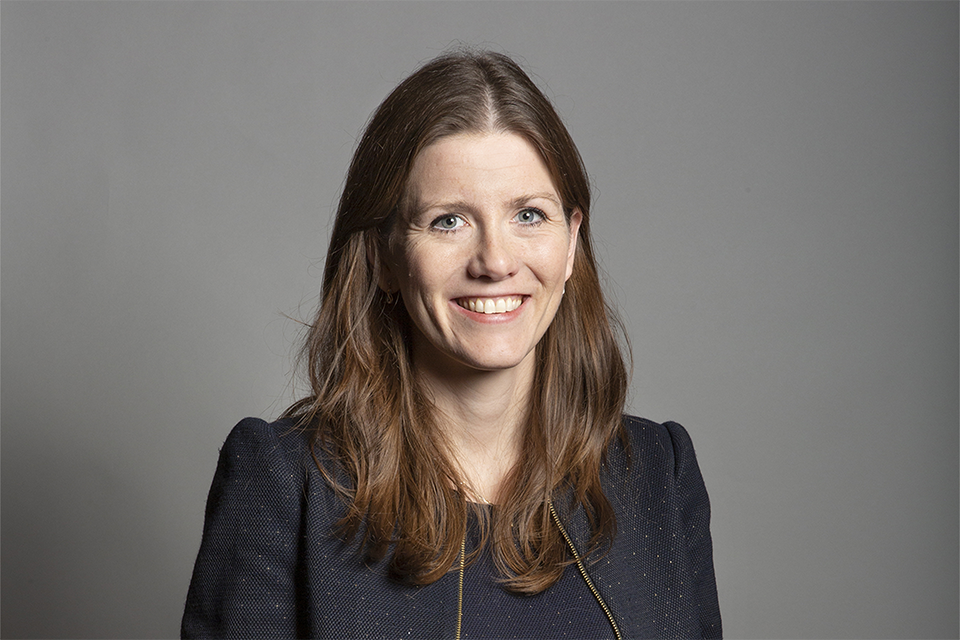
The Rt Hon Michelle Donelan MP
Minister on Leave (Secretary of State)
“The driving motivation must remain to deliver robust connections and lightning-fast connectivity, and to generate growth and create genuine opportunities for people across the UK.”
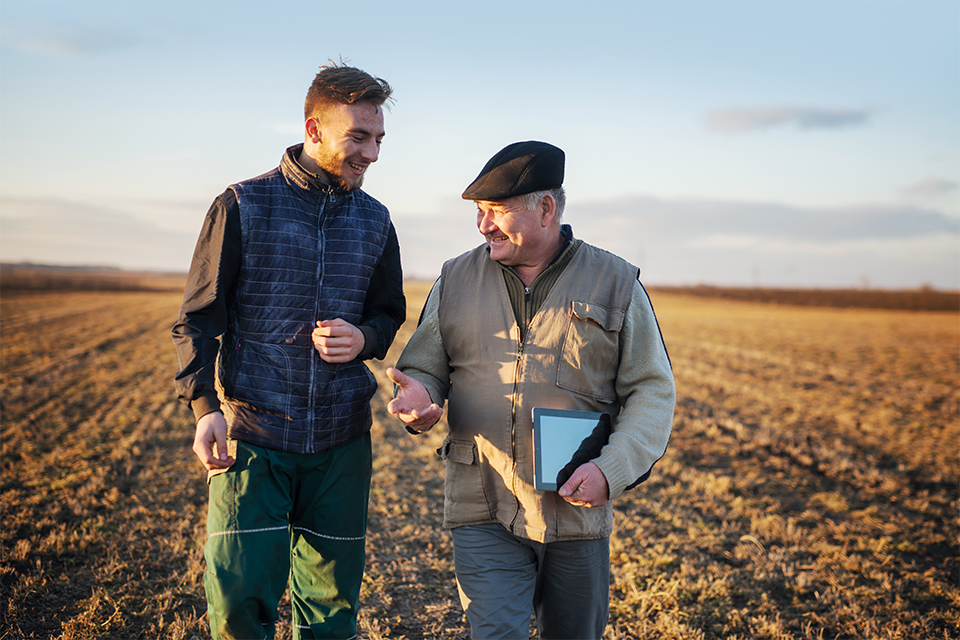
2. Introduction - Chief Executive Officer and Chair of Building Digital UK
April 2023 marked our first anniversary as an executive agency. We have our own Board, our Head Office in the heart of Manchester and a clear sense of mission and purpose: to bring fast and reliable digital connectivity and transform communities in hard-to-reach places across the UK.
Our two core programmes, Project Gigabit and the Shared Rural Network (SRN), require significant collaboration with local councils, devolved administrations and the private sector. It would be remiss not to acknowledge and thank our partners for helping us to deliver the tangible benefits that these programmes will bring to areas across the country. Our relationships will be key as we work together to achieve many of the objectives contained within this plan.
This Corporate Plan sets out our objectives, measures and milestones to:
-
Deliver gigabit-capable connectivity to premises outside suppliers’ commercial rollout plans
-
Improve mobile internet connectivity by delivering the SRN programme
-
Make BDUK a great place to work, inspiring and empowering our people to perform at their best
-
Provide excellent financial management, supported by strong governance and risk frameworks
-
Develop practical digital solutions to solve our delivery challenges and transform how we use data

We have committed to delivering gigabit-capable connectivity to more than 1.5 million premises in hard-to-reach parts of the UK by the end of 2025, and then go further to support the government’s target of nationwide gigabit-capable broadband by 2030.
We have made an excellent start. We awarded our first Project Gigabit contract in August 2022, we have followed that with many more, and we plan to launch our first procurements in Wales, Scotland and Northern Ireland by the end of 2023 to 2024. The next two years will see more contracts awarded for Project Gigabit kickstarting delivery that will run to 2030 and beyond. While we remain ever mindful of market challenges and economic headwinds, we will continue to push ahead with this critical phase of our work.
These procurements, alongside our vouchers scheme and the delivery of superfast contracts and GigaHub projects, are central to our strategy for meeting our objectives.
Working with our partners, we will also deliver the SRN. The programme sees the government and industry jointly invest over £1 billion to extend 4G mobile coverage to 95% of the UK landmass. Coverage levels are already increasing, and this plan sets out how we will continue to work with mobile network operators to bring 4G to more parts of the UK that currently have poor, or no, coverage.
These complex programmes are some of the most difficult in the country. As an executive agency, we will plan, challenge and manage our finances, at all times maximising value for money. Furthermore, we will assure this expenditure with strong governance structures and robust risk management, as well as implementing a streamlined approach to deliver technical services to help achieve our programmes’ objectives.
We now form part of a brand new government department: the Department for Science, Innovation and Technology (DSIT). This is an exciting time full of opportunity and possibility. Our talented and dedicated people have a core role to play in developing DSIT’s culture and ways of working. BDUK will continue to foster an environment in which our people feel well supported to help achieve our objectives and fulfil their own personal and professional goals.
To that end, BDUK will continue to live and champion our values of Delivering Excellence, Embracing Challenges, Respecting Differences and Working Together.
Over the three year span covered by this Corporate Plan, Project Gigabit and the Shared Rural Network will deliver improved connectivity that will transform people’s lives. Homes, businesses, schools, colleges, council facilities, tourist attractions, hospitals and more, in rural places in all four of our nations, are already accessing lightning-fast reliable connectivity and using it to make life better for people in those communities. Continuing to deliver these improvements for the public should be what drives us to even bigger and better things in the three years to come.
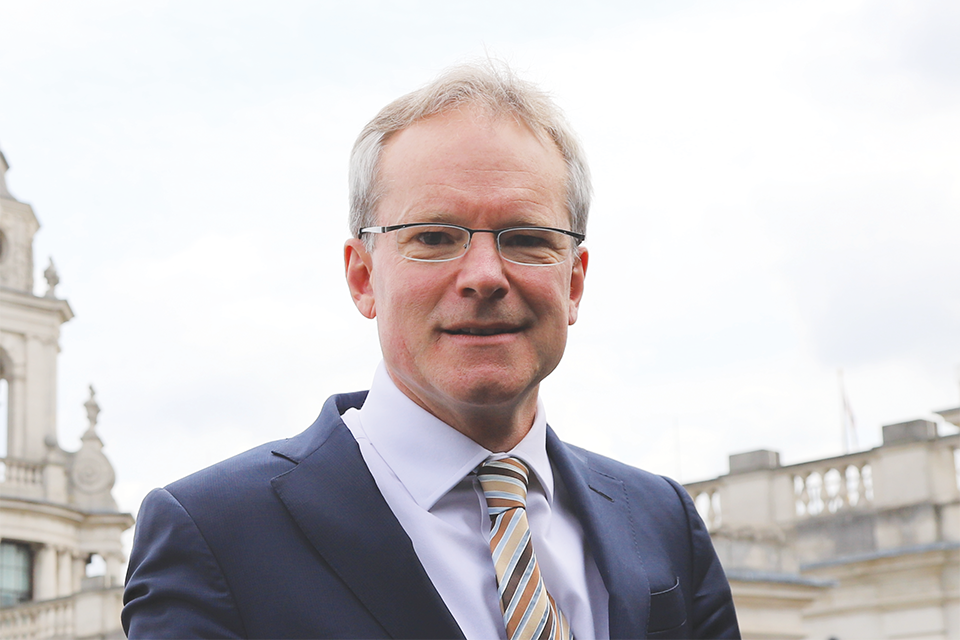
Paul Norris
BDUK Chief Executive Officer
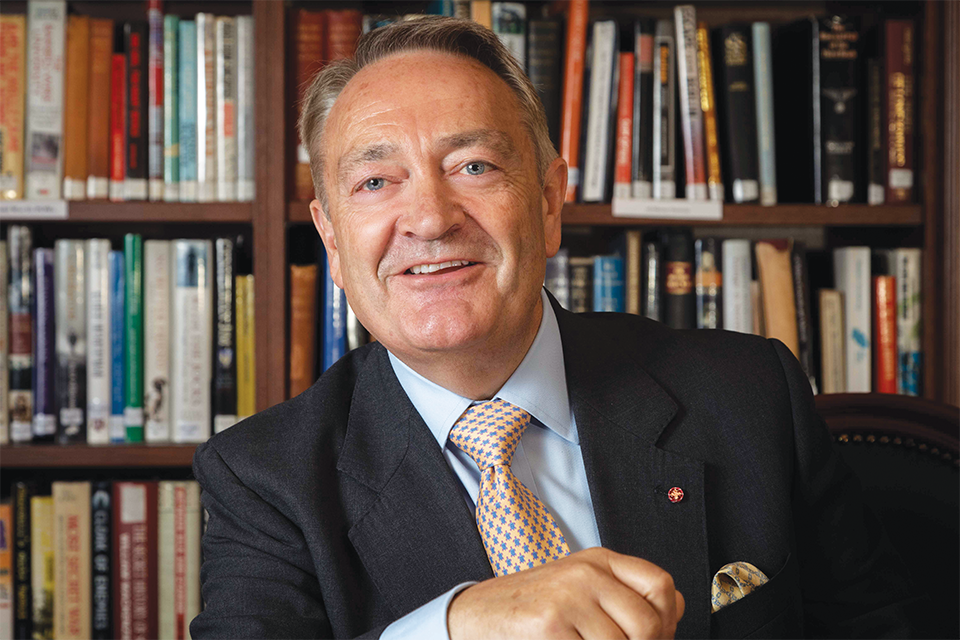
Simon P. Blagden CBE
BDUK Chair
“Over the three year span covered by this Corporate Plan, Project Gigabit and the Shared Rural Network will deliver improved connectivity that will transform people’s lives.”
3. Who we are
BDUK is an executive agency of DSIT with a mission to ensure that homes and businesses across the UK can access fast and reliable digital connectivity.
We are responsible for the rollout of gigabit-capable broadband and the expansion of mobile coverage in hard-to-reach areas of the UK. Delivering our mission is a team effort across government, industry, local councils, devolved administrations, regulators, consumer groups and citizens. We work with these partners to ensure that people can access the reliable digital connectivity that can transform their lives.
The fast, reliable connections delivered by our programmes will level up mostly rural and remote communities across the UK, as well as tackling pockets of poor connectivity in urban areas. Closing this digital divide will enable people across the country, wherever they live and work, to grasp the opportunities that connectivity brings. Our work will:
-
Create and support thousands of high-paid, high-skilled jobs. The digital connectivity we are delivering will also give people greater flexibility to work from any location, increasing employment opportunities in rural and remote locations. Innovators and wealth creators will be able to start-up and run a business of any size from anywhere in the UK, and then manage their business on the go.
-
Provide people from remote areas with greater access to online services, including remote GP appointments, learning and training opportunities, and local government services.
-
Enhance people’s home life, with the ability to stream movies, TV and video games in higher quality onto multiple devices at the same time, with no slowdowns in speed. Better connectivity also allows for more internet-connected smart appliances.
-
Enable more people to stay connected, shop online and stream entertainment on the go, wherever they are in the UK, thanks to improved mobile coverage.
BDUK is set up as a specialist delivery organisation with a clear focus on digital infrastructure programmes. In February 2023, our sponsor department changed from DCMS to DSIT. This represents a great opportunity to work with innovation and technology-focused colleagues to accelerate the rollout of both broadband and mobile connectivity across the UK. We work closely with colleagues in the Digital Infrastructure directorate of DSIT to support the telecommunications sector, funding connections to places that suppliers will not reach through their commercial plans alone. We are aligned to the government’s mission to level up the UK and we are transforming rural and remote communities into places where people have the confidence to settle, raise their families and start successful businesses. The improved digital infrastructure we deliver will underpin the government’s ambition to grow the economy and improve the lives of people across the UK through stronger growth, better jobs and careers, and new discoveries that advance the health and prosperity of society.
Our Chief Executive Officer (CEO) is both the Accounting Officer and the Senior Responsible Owner for our two flagship programmes: Project Gigabit and the SRN. The CEO is held to account by the Secretary of State, Minister of State, and DSIT’s Principal Accounting Officer. The CEO is also advised and challenged on strategy, delivery and risk management by BDUK’s Board.
To achieve our goals, our work is underpinned by four core values: Embracing Challenges, Delivering Excellence, Working Together and Respecting Differences.
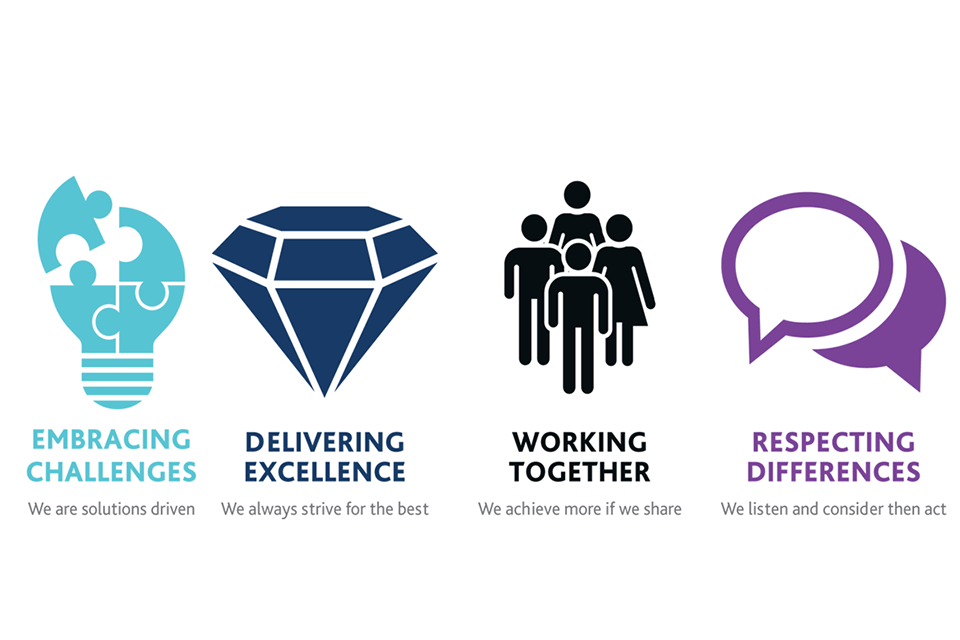
4. What we do: delivering our mission
We have a clear mission: to ensure that homes and businesses across the UK can access fast and reliable digital connectivity. This will be achieved through delivery of our two core programmes:
Project Gigabit
A £5 billion programme to deliver gigabit-capable broadband to homes and businesses across the UK.
The programme will support the government’s target to ensure nationwide gigabit-capable broadband by 2030, making sure that people have the same access to fast and reliable connectivity wherever they live, work and study.
Shared Rural Network
The £1 billion SRN brings mobile broadband to rural communities across the UK.
Developed by the UK’s four mobile network operators and government, the programme will deliver 4G coverage to 95% of the UK[footnote 1], enabling rural businesses and communities to thrive.
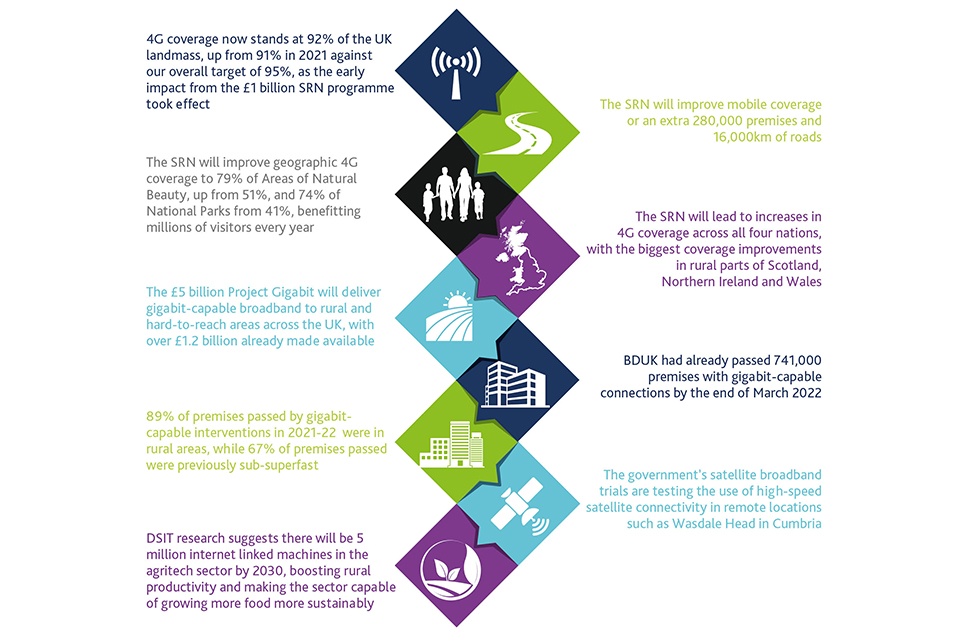
4.1 Fulfilling the government agenda: the policy context behind our work
Project Gigabit and the SRN programmes support the government’s levelling up agenda to reduce regional inequalities. Our work to improve broadband and mobile coverage will help to bridge the digital divide and enable people across the UK to enjoy the advantages of cutting-edge connectivity for their families, businesses and communities.
The government’s Levelling Up white paper[footnote 2] includes digital connectivity as one of its 12 missions with the goal of ensuring that: ‘By 2030, the UK will have nationwide gigabit-capable broadband and 4G coverage, with 5G coverage for the majority of the population’. The white paper specifically highlights that improved digital connectivity has the potential to drive growth and productivity across the UK and widen job opportunities through remote working.
Both Project Gigabit and the SRN are also key components of the government’s National Infrastructure Strategy, updating the UK’s infrastructure to face the challenges of the 21st century.
Delivering across the UK involves working closely with devolved administrations to ensure excellent digital connectivity is available in Scotland, Wales and Northern Ireland.
For Project Gigabit, good progress has already been made in delivering gigabit connectivity through projects including R100 in Scotland, Project Stratum in Northern Ireland and Superfast Cymru in Wales. These projects are delivering extensive gigabit coverage in some of the hardest to reach parts of the UK. Following reviews of coverage delivered by these projects and commercial rollout plans, procurements in Wales are now getting underway, while the final mapping and review of eligible premises is taking place in Scotland and Northern Ireland prior to procurements starting during the course of 2023 to 2024.
The SRN programme involves considerable cooperation with industry and the devolved administrations, with the biggest coverage improvements forecast in the most rural parts of the UK.
Both of our programmes are forward thinking and will help lay the foundations for future-proofed digital connectivity for people across the UK.
We work with other government departments, regulators, the private sector and public bodies to deliver these programmes. Most recently, our sponsor department (DSIT) has worked with the Department for Environment, Food and Rural Affairs to appoint Simon Fell MP as the government’s rural connectivity champion. The champion will convene rural businesses and the telecoms industry to support adoption of digital connectivity in sectors such as agriculture and develop, in partnership with rural businesses, a clear understanding of what connectivity is needed to drive innovation and growth up and down the country.

4.2 Overcoming challenges
At the heart of our mission is tackling the disparities in the quality of broadband and mobile coverage across the country. Rural areas are more likely to experience poor quality digital connectivity, but pockets of poor broadband connectivity in urban areas also hinder communities in our towns and cities.
Our programmes are necessary because the market’s commercial rollout plans have limitations in their scope, and hard-to-reach homes and businesses would otherwise be left behind without government intervention.
A key challenge for Project Gigabit is that suppliers continue to commit to building networks under their own commercial plans, passing far more premises than BDUK had originally anticipated. This is good news, as premises are likely to receive gigabit-capable connectivity sooner and at no additional cost to the public purse. However, the consequence is that premises that remain outside the scope of these commercial build plans are some of the hardest and most expensive to reach in the UK, reinforcing the need for government subsidy to reach nationwide gigabit connectivity.
The speed, scale and timing of Project Gigabit means that BDUK is seeking to subsidise suppliers to build gigabit-capable infrastructure in hard-to-reach areas while suppliers’ own commercial build is constantly expanding and changing. To ensure we only subsidise build where it is needed, and so meet our obligation to secure value for money, we invest time and effort to carefully consider suppliers’ commercial build plans and then adjust our interventions as necessary. We are confident that by continuing to work closely with the market, we are putting ourselves in the best position to achieve our goals, while balancing the trade-off between pace and our obligation to secure value for money.
The government’s modelling indicates that there will be a small number of premises (less than 1%) outside the scope of Project Gigabit, on the grounds that they are too costly to connect. We are working with our colleagues in DSIT to find solutions to reach these premises, with a series of pilot projects launched in 2022 aimed at improving connectivity for this group of Very Hard to Reach premises.
The key challenge facing the SRN programme is the difficulty of locating sites in very rural and hard-to-reach areas. This can present problems in relation to acquisition (such as landowner agreements and gaining planning permission), access, power solutions, construction, and transmission. We work closely with our delivery partners to support in resolving these issues where possible. In addition, we work with the Home Office, Digital Mobile Spectrum Limited[footnote 3] and the mobile network operators to ensure appropriate commercial agreements are in place to deliver upon our objectives.
Both Project Gigabit and SRN must navigate wider macroeconomic, resource and financial challenges with our partners. The market remains dynamic, with changes to inflation, interest rates, supply and labour costs causing uncertainty for commercial and subsidised delivery. Higher costs will impact delivery for suppliers, costs of materials and resourcing, while lower consumer appetite for more expensive connections and higher borrowing rates may dampen some investors’ enthusiasm for the digital infrastructure market.
We will continue to coordinate future scenarios and develop contingencies to ensure successful digital delivery. We will also continue to work closely with key stakeholders on labour, supply chain and inflationary factors that we are observing, and any wider unintended consequences from local, regional, national and global economic circumstances. We understand that mitigating these risks by adapting and optimising our strategy is crucial in delivering our mission.

4.3 Delivering across the UK
Our programmes are already making a difference across the country, transforming the lives of communities and opening up new opportunities for businesses.
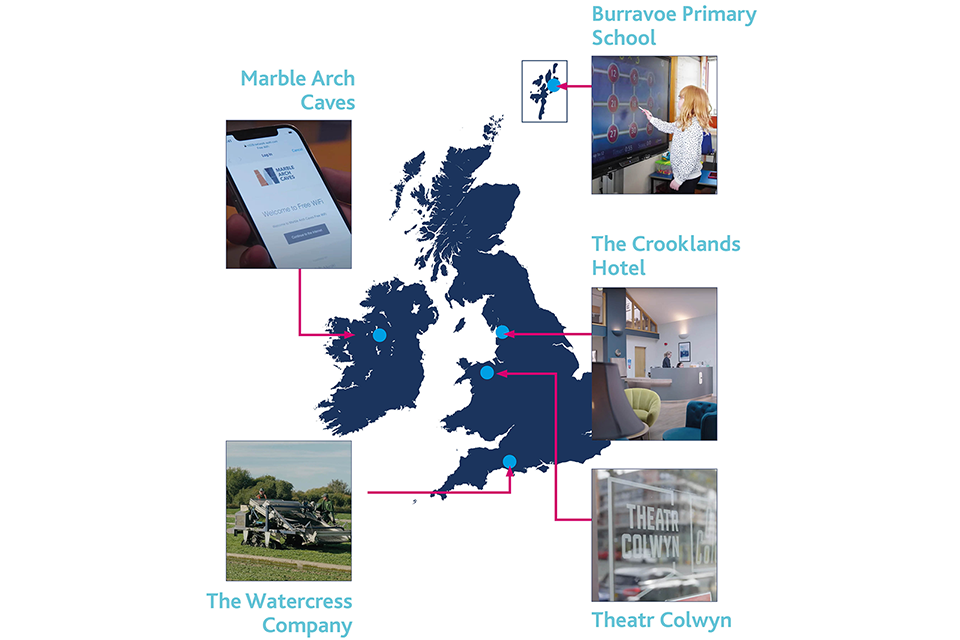
Burravoe Primary School is located on the island of Yell in the North Isles of Shetland. Due to its rurality, the school suffered from extremely poor broadband connectivity. The connection to gigabit-capable broadband has been truly transformative for pupils and teachers alike. Lessons now make use of fast and reliable digital connections with no interruptions, even if multiple classes are using it at the same time. The gigabit connection even enables the children to have Mandarin classes online with a teacher in China, opening up the world of education beyond what was previously thought possible.
The Crooklands Hotel is an independent family run hotel, situated just outside the Lake District. Due to previously poor internet access, many rooms did not have a WiFi connection and the management were unable to undertake simple tasks using outdated equipment. Following the successful delivery of their community broadband scheme, supported by our Gigabit Broadband Voucher Scheme[footnote 4], the hotel has seen its internet speeds transformed. Gigabit broadband allows for mobile payment terminals, so payment can be made throughout the hotel, and with the introduction of iPads in the restaurant, kitchen and reception, staff have access to real-time data.
Marble Arch Caves is a major tourist attraction set in the foothills of Cuilcagh Mountains in County Fermanagh, Northern Ireland. It offers a range of exciting activities and memorable experiences. Though always a popular site with numerous visitors and many employees, poor broadband connectivity was impeding smooth business operations. Since the introduction of a gigabit connection, customers are now able to seamlessly make bookings online by using their cloud system. Excitingly, they have also introduced a virtual tour thanks to this upgrade.
Theatr Colwyn is the oldest civic theatre/cinema in Wales and had its internet speeds boosted by 700% as a consequence of a neighbourhood Local Full Fibre Network project. This drastically improved its operations as feature films can now be transferred via a server over broadband and at a far superior quality - including up to 4k resolution - and customers can make swift card payments for admission, memberships… and popcorn.
The Watercress Company is an arable business based in Dorchester, Dorset. It supplies customers in the UK and Europe with watercress, baby leaf salads and wasabi in a sustainable way. The business received the boost of gigabit broadband with the help of the Gigabit Broadband Voucher Scheme. Dramatically faster broadband connection has meant greater efficiency and communication with partner sites in Spain and the United States, as well as giving employees the option of hybrid working.
5. What we do: Project Gigabit
Project Gigabit’s objective is to level up the UK by giving hard-to-reach areas access to gigabit-capable internet speeds[footnote 5], and, in tandem with suppliers’ commercial gigabit delivery, support the government’s target of nationwide gigabit-capable broadband by 2030. Having fast and reliable broadband means households no longer have to battle over bandwidth, people are able to enjoy the freedom to live and work more flexibly, businesses can increase their productivity, and vital public services can better serve our communities in remote locations. These lightning-fast connections are future-proofed and designed to meet the UK’s broadband needs for decades to come.
Project Gigabit was launched in March 2021, building on successful legacy programmes such as the Superfast and Rural Gigabit Connectivity programmes. The government has committed £1.2 billion to Project Gigabit until the end of 2024 to 2025, out of a total budget of £5 billion over the lifetime of the programme.
Our interventions aim to deliver gigabit-capable connectivity to at least 1.56 million premises across the UK in hard-to-reach areas by the end of 2025[footnote 6], supporting the government’s target of at least 85% connectivity through a combination of suppliers’ commercial build and subsidised build, and then to nationwide gigabit-capable broadband by 2030.
5.1 Our interventions
To meet our delivery targets, we take a strategic approach using four types of intervention to suit supplier and local needs:
Delivery in detail: Project Gigabit’s four interventions
The premises outside suppliers’ commercial rollout plans are subsidised through four main interventions:
-
Superfast contracts - projects under the Superfast Broadband Programme that have been reconfigured to deliver gigabit-capable connectivity. Extra funding from Project Gigabit is being used to extend existing contracts to deliver additional gigabit infrastructure.
-
Gigabit Broadband Voucher Scheme - vouchers worth up to £4,500 for both residential and commercial premises, which can be claimed by anyone in eligible rural areas to cover the costs of a supplier extending their network to their premises.
-
GigaHubs - grants to connect vital local public services, typically schools, libraries and GP surgeries, in hard-to-reach areas.
-
Gigabit contracts - contracts with suppliers to extend their plans to build gigabit-capable infrastructure to premises that will not be reached by their commercial plans alone. This support ranges from smaller local contracts (aimed at reaching 1,000 to 10,000 premises), to larger regional contracts (up to 100,000 premises) and cross-regional contracts (up to 500,000 premises).
5.2 Our key principles
-
Target hard-to-reach areas. Our interventions are targeted at premises in hard-to-reach parts of the UK. These are predominantly, though not exclusively, in rural and remote locations, and are often areas with lower levels of superfast coverage. Our contracts include provisions to ensure that areas with the lowest speeds are among some of the first to be targeted.
-
Plan and execute delivery alongside suppliers’ commercial rollout. To ensure that hard-to-reach areas are not left behind, we work with the commercial market to include premises excluded from commercial plans within our programme.
-
Ensure value for money. We minimise the risk of funding premises that could have been reached commercially, and ensure our subsidies to suppliers represent good value.
-
Adapt to change. As a decade-long programme, Project Gigabit will need to adapt to changing technology, and changing market appetite and capacity, to find the most appropriate solutions for bringing fast, reliable broadband to different communities.
-
Regular and transparent reporting. We publish quarterly Project Gigabit delivery updates that provide details about the location, timing and value of procurements and contracts for each area of the UK[footnote 7]. Each year, we will publish our delivery performance in our Annual Report and Accounts. We also conduct detailed market surveys in each area where our interventions are targeted, and we publish the outcomes of these and identify those areas where we propose to intervene. Once contracts are awarded, full details are published in line with UK Subsidy Control provisions on the government’s Contracts Finder website.
We have included further information describing the detailed steps in the Project Gigabit contracts process in our previous Corporate Plan 2022 to 2023.
5.3 Our progress
We are working to roll out gigabit-capable connections across the UK. Procurements are now live across England, and will be launched in 2023 to 2024 in the devolved administrations. The map below shows the status of our procurements across the UK as reported in our Project Gigabit progress update, June 2023:
Project Gigabit Intervention Areas Map[footnote 8]
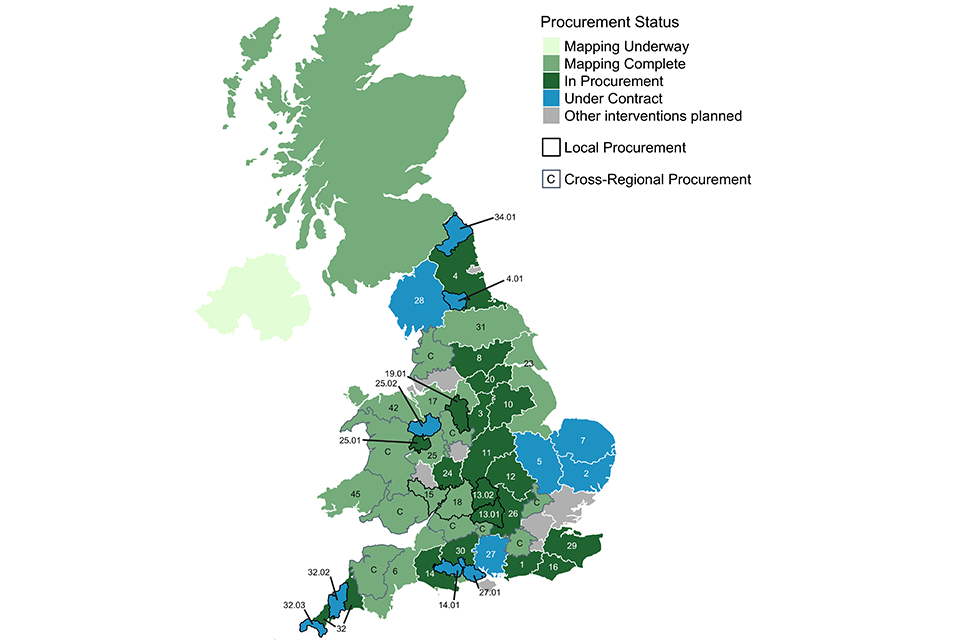
Note: Objective 1, below, outlines our plans for launching procurements in Scotland, Wales and Northern Ireland this year.
6. What we do: the Shared Rural Network
The SRN programme will level up mobile coverage in rural areas across the UK through a £1 billion deal with the four mobile network operators (MNOs) - EE, Three, VMO2 and Vodafone - delivering 4G coverage to some of the hardest to reach parts of the country. It will allow for new applications to flourish in rural sectors, give rural consumers more choice over their mobile providers and how they access the web, as well as ensuring greater connectivity across communities.
This programme will see MNOs collectively increase 4G mobile phone coverage throughout the UK, so 95% of the UK geography will have coverage from at least one mobile network operator by the end of 2025. The programme is on track to meet this target, and further coverage improvements in hard-to-reach areas will continue to be delivered until the start of 2027. The SRN will improve mobile coverage for an extra 280,000 premises and 16,000km of roads.
The programme will lead to increases in coverage across all four nations, with the biggest coverage improvements in rural parts of the UK:
Table 1: Forecast increase in 4G coverage from the SRN
| 4G Coverage from all MNOs | 4G Coverage from at least one MNO | |||
|---|---|---|---|---|
| Pre-SRN | Forecast post-SRN | Pre-SRN | Forecast post-SRN | |
| Overall | 69% | 84% | 91% | 95% |
| England | 84% | 90% | 97% | 98% |
| Scotland | 44% | 74% | 81% | 91% |
| Wales | 60% | 80% | 90% | 95% |
| Northern Ireland | 79% | 85% | 97% | 98% |
Source: Digital Mobile Spectrum Limited
Note: The coverage improvement forecast is based on the initial radio plan, which was submitted to Ofcom in June 2020, and is subject to change as the programme progresses. All % figures rounded to whole figures. Pre SRN figures taken from Ofcom 2020 Connected Nations Report published 12 May 2021, showing coverage data as of Jan 2021. The forecast improvements are subject to availability of Extended Area Service sites.
The box below outlines the key phases in the delivery of the programme.
Delivery in detail: the SRN rollout phases
The programme is delivered in two parts:
-
Phase one - The first phase will see the four MNOs collectively invest over £532 million in a shared network of new and existing phone masts. This will help tackle Partial Not Spots, which are areas where there is currently coverage from at least one, but not all, mobile operators. This part of the programme is wholly for the MNOs to deliver, but where possible we provide support, for example, by endorsing planning applications. The MNOs are obliged to complete this element of the programme by June 2024 to meet licence obligations.
-
Phase two - The second phase, running in parallel, will see the government invest over £500 million to go even further to significantly reduce Total Not Spots, which are areas where there is currently no coverage from any mobile operator. As part of this government-funded element of the programme, there will be upgrades to Extended Area Service[footnote 9] masts being built as part of the Home Office’s Emergency Services Network. This will make these masts usable by the four MNOs. This element of the programme is to be completed by January 2027 to meet licence obligations.
The maps below show projected 4G coverage before and after the SRN programme, with blue as areas that have coverage, yellow as Partial Not Spots, and Orange as Total Not Spots. More details of our coverage targets by region can be found at the SRN website. We will report progress against these targets, measured by Ofcom.
Maps showing projected coverage by the end of the SRN programme
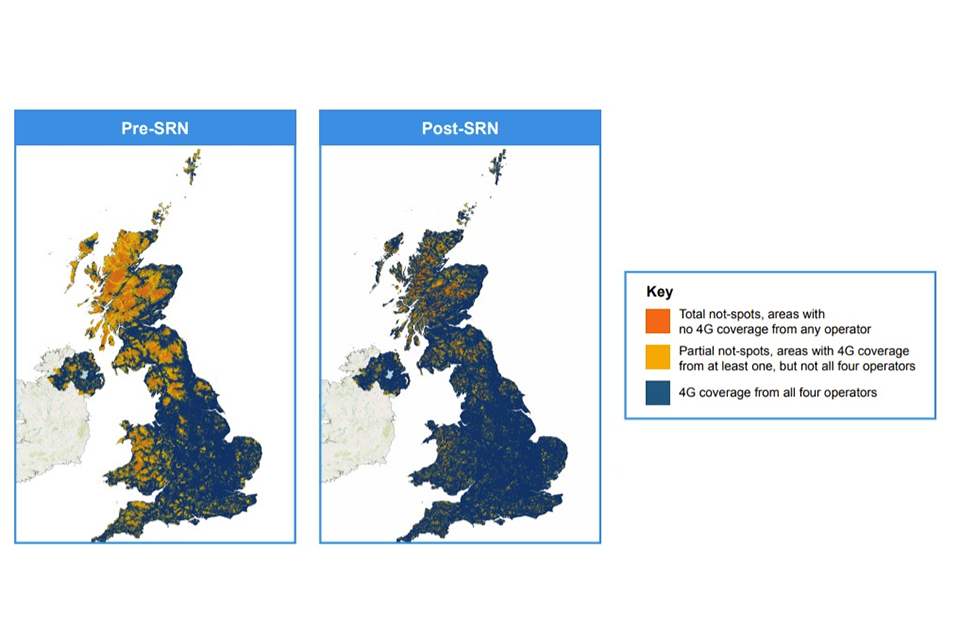
Source: Digital Mobile Spectrum Limited, updated June 2021
Note: Forecast improvements subject to availability of sites, obtaining power supply and backhaul, and securing the necessary permissions through the planning system.
7. Overall objectives for 2023 to 2026
This plan sets out our five key objectives for the three-year period starting in April 2023 and ending in March 2026. These objectives support our mission to ensure that homes and businesses across the UK can access fast and reliable digital connectivity.
In this plan, we also set out the more detailed sub-objectives that sit under each objective for the year ahead. The overall objectives will stay with us over the next three years (subject to adaptations in our strategy), with the sub-objectives under them refreshed annually.
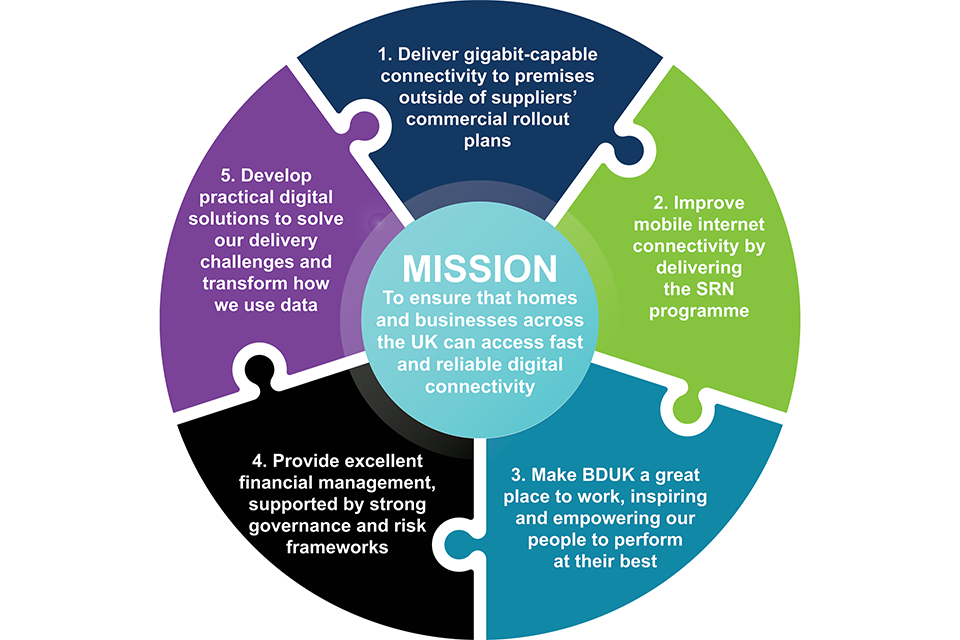
-
Deliver gigabit-capable connectivity to premises outside suppliers’ commercial rollout plans
We will deliver gigabit-capable connectivity to at least 1.56 million premises across the UK in hard-to-reach areas by the end of 2025, supporting the government’s target of at least 85% connectivity through a combination of suppliers’ commercial build and subsidised build, and then to nationwide gigabit-capable broadband by 2030. -
Improve mobile internet connectivity by delivering the SRN programme
We will work with our partners to deliver the SRN, a programme that will see the government and industry jointly invest over £1 billion to extend 4G mobile coverage to 95% of the UK geography. -
Make BDUK a great place to work, inspiring and empowering our people to perform at their best
We will foster an environment in which our people feel well supported to help achieve our objectives and fulfil their own personal development goals. We will champion our values of Embracing Challenges, Delivering Excellence, Working Together and Respecting Differences. -
Provide excellent financial management, supported by strong governance and risk frameworks
We will plan, challenge and manage finances to meet our programmes’ delivery objectives while maximising value for money and strengthening public trust. We will assure this expenditure with strong governance structures and robust risk management. -
Develop practical digital solutions to solve our delivery challenges and transform how we use data
We will implement a streamlined approach to deliver technical services to help achieve our programmes’ objectives. Our digital approach will support the refinement and distribution of high quality data, encourage collaboration across our functions and improve data driven decision-making.
7.1 Reporting in BDUK’s Annual Report and Accounts
Project Gigabit’s key measure of success is ‘premises passed through BDUK interventions’. Premises are ‘passed’ when they are able to take up a gigabit-capable service without significant additional connection costs.
In our Annual Report and Accounts, we will include six key quantitative performance indicators, as well as reporting on specific measures and milestones set out in this plan:
Table 2: Summary of BDUK’s key quantitative performance indicators (KPIs)
| Name of KPI | What it measures |
|---|---|
| Project Gigabit: premises passed | Gigabit-capable premises passed by BDUK interventions against target, segmented by product, region, and premises type. |
| SRN: 4G coverage | 4G landmass coverage, segmented by mobile network operator and region. |
| Value for money | Average subsidy per premises passed. |
| BDUK capital spend | Project Gigabit, SRN and Superfast capital spend by BDUK interventions against budget. Ideally, capital spend is on budget, to maximise delivery for the financial year and value for money. |
| BDUK resource spend | How much we have spent on our workforce and resources over the past year. Ideally, resource spend is on budget, to maximise our resources and so ensure we have the best chance at delivering our objectives. |
| BDUK workforce against target headcount | How many people we have employed into roles from our target headcount. |
7.2 Project Gigabit’s delivery profile to December 2025
Table 3 below sets out our proposed trajectory for reaching 1.56 million premises by the end of 2025, supporting the government objective of at least 85% of premises passed through a combination of suppliers’ commercial build and subsidised build.
In the coming year, 2023 to 2024, many of our Superfast contracts - including those that have been reconfigured to deliver gigabit capability - will come to an end, while our first Gigabit contracts will be in the early stages of delivery. As significantly more Gigabit contracts are awarded in 2023 and 2024, the following years will see a substantial increase in premises passed.
Table 3: Target trajectory for the number of premises passed through BDUK interventions to reach the delivery target of 1.56 million premises by the end of 2025
| Up to March 2022 | April 2022 to March 2023 | April 2023 to March 2024 | April 2024 to March 2025 | April 2025 to December 2025 | |
|---|---|---|---|---|---|
| Cumulative premises passed by BDUK interventions | 742,000 | 875,000 | 1,000,000 | 1,200,000 | 1,560,000 |
| Premises passed by BDUK interventions for each period | 742,000 | 133,000 | 125,000 | 200,000 | 360,000 |
| Total per cent premises passed (includes both commercial and subsidised delivery) | 67% | 75% | 78% | 82% | 85% |
Notes:
- This table shows the minimum number of premises BDUK believes must be passed through its interventions each year in order to hit the 1.56 million interim target by the end of 2025. This is not BDUK’s central delivery forecast.
- Cumulative premises passed by BDUK interventions: Shows a running cumulative total of the premises passed using our interventions.
- Premises passed by BDUK interventions for each period: Shows the number of premises we have passed / expect to pass - with our interventions. As our Gigabit contracts begin to deliver and Superfast contracts wind down, we expect to see delivery steadily build before substantially increasing from April 2024 to December 2025 as even more Gigabit contracts enter the delivery phase. Note that the number of premises passed in 2022 to 2023 will be published in our Performance Report later in 2023, as part of BDUK’s Annual Report and Accounts.
- Total per cent premises passed (includes both commercial and subsidised delivery): This is the total number of premises we expect to be passed by our own interventions and the wider market’s commercial plans. This shows at least 85% of UK premises being passed by the end of 2025.
Our minimum target trajectory has been updated to reflect the latest information on expected programme delivery up to the end of 2025. It illustrates the number of premises BDUK would need to pass each year in order to reach our target of 1.56 million premises passed with gigabit-capable broadband by the end of 2025.
We have updated our delivery assumptions in light of evidence from early projects, including contract milestone data from the first procurements. Based on suppliers’ build plans, we have revised our delivery profile to model 100,000 fewer premises passed in 2023 to 2024 and 135,000 more in 2025. Some changes are also due to the continued strong performance of the market, with commercial coverage reaching further than previously expected. As a result, and in order to protect value for money, our interventions tend to cover fewer premises than we forecast a year ago. In some areas, smaller voucher projects are being used to target the remaining uncommercial premises instead of a procurement process. We have also revised the timings of some procurements in order to reflect additional commercial build, in line with our approach of designing procurements to be as attractive as possible to the market, based on the latest available data.
The pace of delivery from our new gigabit contracts, which is the majority of the delivery to 2025, is inherently uncertain. Our forecasting extrapolates from trends seen in the milestones for the first nine signed contracts, and with a pipeline exceeding 40 contracts it is likely that our assumptions will change again in future iterations. The uncertainty is compounded by suppliers balancing their bids on Project Gigabit with competing commercial build.
BDUK’s delivery is also exposed to broader market risks. These include consolidation, the availability of capital, and - in the worst case - supplier failure. We regularly review these risks and model their uncertainty and impacts as part of our internal forecasting.
7.3 Project Gigabit and the commercial market
Our relationship with the commercial market is critical to the successful delivery of Project Gigabit. The next three years will see suppliers continue to expand their commercial gigabit-capable networks, while working with us to deliver coverage to hard-to-reach areas. Over 76% of UK premises can already access a gigabit-capable connection[footnote 10]. A summary of connections by supplier is included below:
Chart showing gigabit-capable connections by supplier[footnote 11]
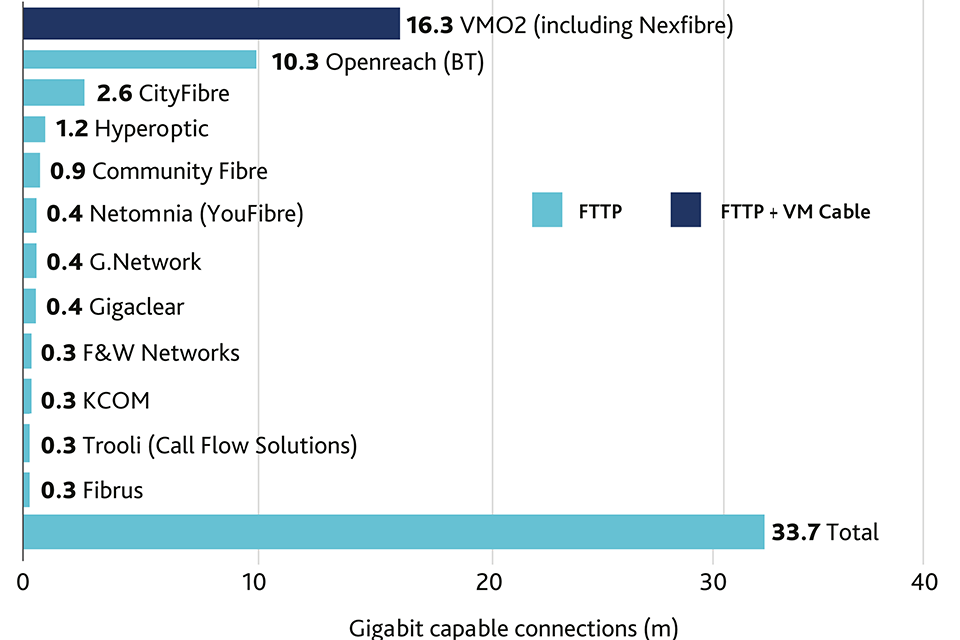
The commercial market has announced nearly £35 billion[footnote 12] to fund broadband delivery. Our commitment of £5 billion over the life of the programme will help enable them to deliver even further and faster. The chart below shows Project Gigabit’s spend so far, as well as what we have committed to live contracts, contracts under procurement, and upcoming procurements.
Chart showing Project Gigabit committed spend breakdown (£million)[footnote 13]
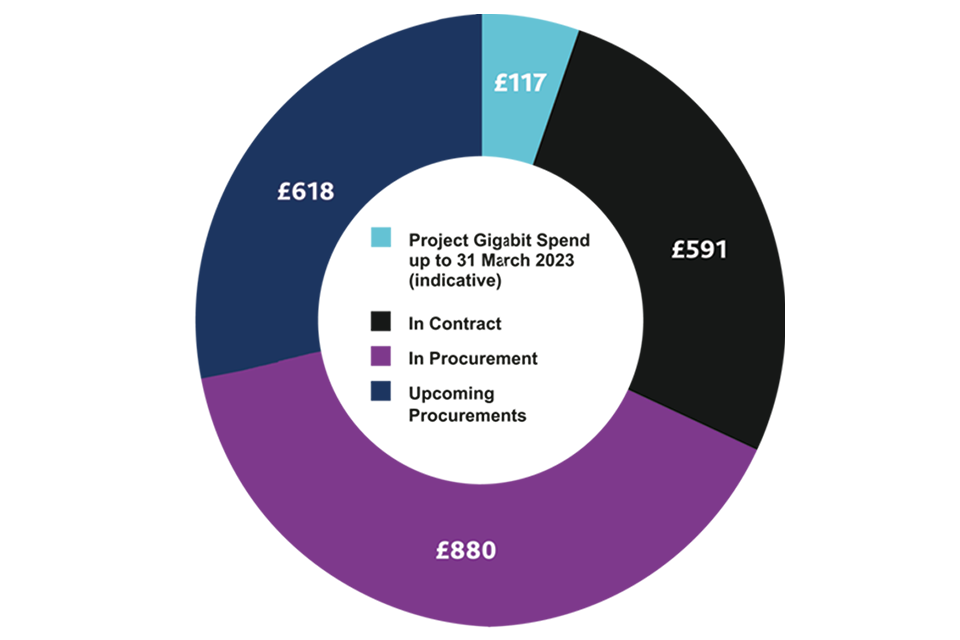
7.4 Our people
Over the next three years, as we concentrate on the delivery phase of our major programmes, we will bring out the best in our skilled and capable workforce. We will invest in learning and development, recognising the value of continued training to deliver the challenging programmes of work we undertake.
Our People Strategy is our commitment to make BDUK a great place to work, where all of our staff can thrive in their careers. It sets out our priorities for developing and supporting our staff, and a plan for how we will tackle these priorities. A key part of this strategy is the introduction of our new People and Development Committee which was launched in March 2023 to focus on our people and help to deliver our strategy and ambitions. Our People Strategy is supported by three pillars:
-
Leadership and Engagement - To provide excellent leadership and management across BDUK
-
Capability and Capacity - To attract, recruit and retain the best people with the right skills
-
Culture, Values, Diversity and Inclusion - To build a culture around our values and behaviours that creates a healthy working environment that values diversity and inclusion
7.5 Diversity and inclusion
Fundamental to BDUK is a focus on improving the diversity of our organisation with an inclusive workplace, aligning to our sponsor department and Civil Service targets for representation. Having a diverse organisation will give us access to a greater range of talent, providing different perspectives which better reflect the communities we deliver to.
Our culture of inclusion will be driven from our leadership, working with our staff to identify our priorities and deliver on them. These priorities will be expanded through initiatives based on improving our peoples’ wellbeing and diverse representation across all grades. In addition, we are committed to ensuring our values and behaviours are practised by everyone across the organisation, from the most senior to the most junior employees. Our ambition is to create a fully inclusive culture where all staff feel valued and are supported to develop their skills and careers, making BDUK an employer of choice.
In 2023, we will launch a new diversity and inclusion strategy which we will develop to reflect our ambitions in this area. This strategy will take into account examples of excellent practice in the field and seek to better understand and improve our diversity data and reporting. We will also engage with staff to agree priorities and measures of success to ensure we have leading practices to recruit, retain and increase representation from an even broader range of talent. Our key priorities for delivering the diversity and inclusion part of our strategy are:
-
Promote and connect to our values and behaviours. We will implement policies and practices, promoted and role-modelled by our leadership, that support a culture of inclusion. We aim to build on our values, ensuring new initiatives have inclusion at their heart.
-
Staff must understand their role in identifying differences in employee experience and values. We will build our understanding and challenge our biases, and embed diversity and inclusion in our teams by investing in training and leadership capability.
-
Support for all staff through wellbeing ambassadors. Staff networks and volunteers contribute massively to the diversity and inclusion agenda and we will support the passionate and dedicated colleagues who make this valuable contribution to BDUK.
-
Respecting differences in an inclusive environment. We will cultivate an environment of respect where people can bring their whole selves to work with a zero tolerance policy for bullying, harassment and discrimination.
8. Detailed objectives for 2023 to 2024
Our three-year objectives set out the overarching vision for what we want to achieve. The detailed sub-objectives for the year 2023 to 2024 set out how we are delivering against the strategy through specific measures and milestones in the next year.
8.1 Overall objective for 2023 to 2026
1. Deliver gigabit-capable connectivity to premises outside suppliers’ commercial rollout plans
We will deliver gigabit-capable connectivity to at least 1.56 million premises across the UK in hard-to-reach areas by the end of 2025, supporting the government’s target of at least 85% connectivity through a combination of suppliers’ commercial build and subsidised build, and then to nationwide gigabit-capable broadband by 2030.
Sub-objectives for 2023 to 2024
| ID | Sub-objective | Measure | Milestone |
|---|---|---|---|
| 1.1 | We will provide gigabit-capable connectivity to an increasing number of premises and drive delivery of Project Gigabit targets through: - Delivering on existing Gigabit contracts, Superfast contracts, voucher projects and GigaHub projects - Setting up future delivery by managing Gigabit procurements [footnote 14] |
Provide gigabit-capable connectivity to 125,000 premises. | By end 2023 to 2024 |
| Complete launch of the majority of Project Gigabit procurements in England in line with our quarterly published pipelines. [footnote 15] | Complete launch of the majority of procurements in England by end 2023 to 2024 | ||
| Launch first procurements in Scotland, Wales and Northern Ireland. | Launch first procurements in Wales by end Q2 2023 to 2024, and Scotland and Northern Ireland by end 2023 to 2024 | ||
| 1.2 | We will monitor and evaluate our interventions for efficiency and effectiveness to support our strategic decision-making. | Undertake quarterly voucher pipeline progress reviews with suppliers, agreeing actions to advance delivery where needed. | Quarterly pipeline reviews |
| Monitor the benefits of our gigabit-capable build as part of the longer-term Project Gigabit evaluation programme, including publishing a Superfast report, GigaHubs report and vouchers report. | By end 2023 to 2024 |
8.2 Overall objective for 2023 to 2026
2. Improve mobile internet connectivity by delivering the SRN programme
We will work with our partners to deliver the SRN, a programme that will see the government and industry jointly invest over £1 billion to extend 4G mobile coverage to 95% of the UK geography.
Sub-objectives for 2023 to 2024
| ID | Sub-Objective | Measure | Milestone |
|---|---|---|---|
| 2.1 | We will work in partnership with the Home Office to make their masts (originally built to support emergency services), available for commercial use too. These Extended Area Service[footnote 16] (EAS) site masts will then be available for mobile network operators (MNOs) to upgrade to 4G and make available to use on their networks. | Launch the first EAS pilot site (the accelerated pilot) and then all remaining pilot sites to test the upgrade of EAS masts and processes. | By end Q1 2023 to 2024 (accelerated pilot) By end 2023 to 2024 (for all remaining pilots) |
| Conclude the two outstanding commercial agreements with network support services, WHP and Airwave, to make a minimum of 15 sites available in the EAS project. | By end 2023 to 2024 | ||
| Ensure a minimum of 50 Home Office sites are upgraded in terms of physical infrastructure. | By end 2023 to 2024 | ||
| 2.2 | We will provide oversight, governance, challenge and guidance to Digital Mobile Spectrum Limited[footnote 17] (DMSL) to ensure the successful delivery of the Total Not Spots[footnote 18] (TNS) element of the programme including progress on site acquisition, design, site build and communications.[footnote 19] | Receive confirmation of the MNOs’ baseline plans for rolling out new masts in rural areas. | By end Q2 2023 to 2024 |
| Ensure 119 planning applications have been submitted for TNS sites. | By end 2023 to 2024 | ||
| Complete build of the Funding Platform by which grants will be claimed, enabling more efficient transactions. | By end Q2 2023 to 2024 |
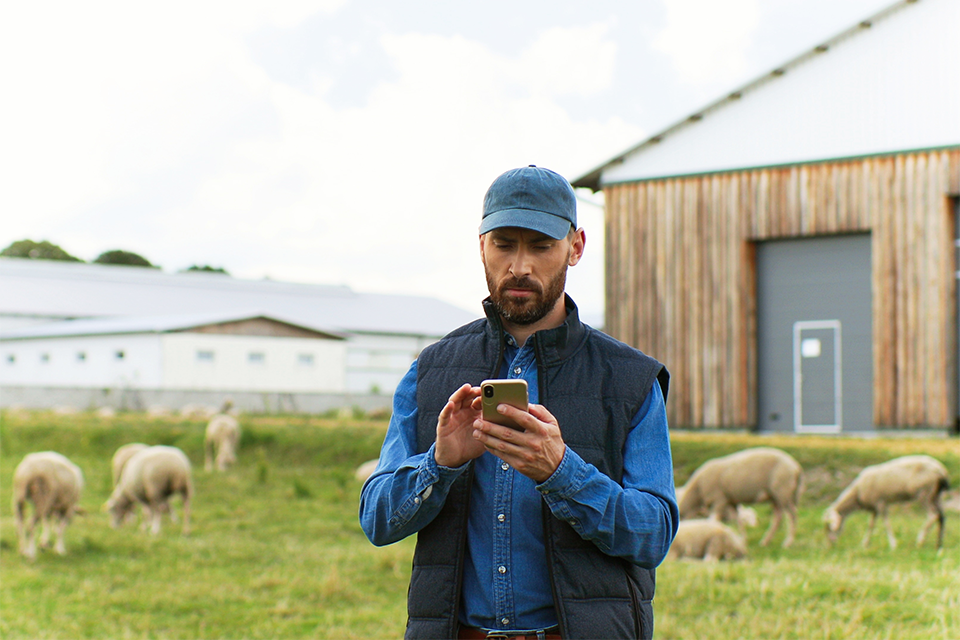
8.3 Overall objective for 2023 to 2026
3. Make BDUK a great place to work, inspiring and empowering our people to perform at their best
We will foster an environment in which our people feel well supported to help achieve our objectives and fulfil their own personal development goals. We will champion our values of Embracing Challenges, Delivering Excellence, Working Together and Respecting Differences.
Sub-objectives for 2023 to 2024
| ID | Sub-Objective | Measure | Milestone |
|---|---|---|---|
| 3.1 | We will strengthen our capability and capacity by developing our workforce by: - Recruiting the right people into the right roles, at the right time. - Retain existing expertise through better employee engagement and a commitment to the wellbeing of staff. |
Drive towards target headcount by aiming to fill at least 70% of vacancies | By end 2023 to 2024 |
| Improve our employee engagement score (as tracked in the annual Civil Service People Survey) from 66% in 2022 to 2023. | By end 2023 to 2024 | ||
| Support learning and development (L&D) by utilising at least 90% of the available budget for L&D. | By end 2023 to 2024 | ||
| 3.2 | We will strengthen our commitment to develop a positive culture, with clear values to support respect, diversity and inclusion. | Champion our values to improve the culture of BDUK. Including regular internal communication and celebrating achievements through our Rewards scheme. | Ongoing 2023 to 2024 |
| Develop and launch a new diversity and inclusion strategy. | By end Q3 2023 to 2024 | ||
| Improve diversity and inclusion from the 2022 to 2023 benchmark. | By end 2023 to 2024 |
8.4 Overall objective for 2023 to 2026
4. Provide excellent financial management, supported by strong governance and risk frameworks
We will plan, challenge and manage finances to meet our programmes’ delivery objectives while maximising value for money and strengthening public trust. We will assure this expenditure with strong governance structures and robust risk management.
Sub-objectives for 2023 to 2024
| ID | Sub-Objective | Measure | Milestone |
|---|---|---|---|
| 4.1 | We will plan and manage resource and capital expenditure to ensure that our spend is within the funding available in 2023 to 2024. We will be an efficient organisation that protects value for money for taxpayers. We will deliver value for money through our subsidy contracts by challenging supplier data and claims, as well as interrogating pricing. |
Operate within delegated funding limits and in line with DSIT requirements. | Ongoing 2023 to 2024 |
| Conduct monthly budget forecast reviews with functions to improve the accuracy of our forecasts. | Monthly reviews | ||
| Aim to pay 90% of undisputed and valid invoices within 5 days and 100% within 30 days, in accordance with government prompt payment guidelines. | Ongoing 2023 to 2024 | ||
| Build financial capability across BDUK by ensuring all Senior Civil Servants have completed budget holder licence training. | By end 2023 to 2024 | ||
| Continuously review supplier cost data through bid and in-life stages to ensure it is in line with the agreed funding envelope and providing value. | Ongoing 2023 to 2024 | ||
| 4.2 | We will build on solid foundations to continuously improve governance and compliance, embedding best practice across the organisation. This includes legal compliance (such as subsidy control and counter fraud), as well as implementing a comprehensive, efficient and effective approach to the management of risk. |
Complete BDUK’s risk improvement plan to ensure risk management maturity increases, evidenced through internal audit. | By end Q2 2023 to 2024 |
| Deliver the annual counter-fraud action plan to continuously improve fraud risk control and assurance. | By end 2023 to 2024 | ||
| Maintain compliance with the new UK Subsidy Control Act 2022. | Ongoing 2023 to 2024 | ||
| 4.3 | We will build trust through providing strong service levels and transparent reporting. | Deliver our first Annual Report and Accounts. | 2023 |
| Respond to 90% of ministerial correspondence within 20 working days. | Ongoing 2023 to 2024 | ||
| Respond to all formal complaints from suppliers/customers within 20 working days in line with our complaints procedure. | Ongoing 2023 to 2024 |
8.5 Overall objective for 2023 to 2026
5. Develop practical digital solutions to solve our delivery challenges and transform how we use data
We will implement a streamlined approach to deliver technical services to help achieve our programmes’ objectives. Our digital approach will support the refinement and distribution of high quality data, encourage collaboration across our functions and improve data driven decision-making.
Sub-objectives for 2023 to 2024
| ID | Sub-Objective | Measure | Milestone |
|---|---|---|---|
| 5.1 | We will maintain, develop and create digital tools and platforms to strengthen operational delivery of our interventions. This includes the development of our platform that allows for the collection, triage, and analysis of delivery data from suppliers. This supports decision making throughout the organisation, identifying potential Intervention Areas[footnote 20], as well as opportunities to optimise the mix of interventions. |
Enhance our data capability, improving data analytics to support decision-making across the organisation. Achieved with the implementation of the BDUK Data Backbone - a platform to support the consistent use of reliable data sources. | By end 2023 to 2024 |
| The Digital Data and Technology (DDaT) team works across the organisation to develop technology solutions that address business requirements. This includes development of the funding platform and executing BDUK’s domain change from our sponsor department, providing us with greater access to the tools and data we need. | Ongoing 2023 to 2024 | ||
| Enhance our data culture, encouraging an environment of ‘data first’ thinking and practice through the implementation of a coordinated strategy and workstreams. This includes leading teach-ins and technical workshops across the organisation and monitoring feedback through questionnaires. | Ongoing 2023 to 2024 |
9. Financial management
We are funded through Resource Delegated Expenditure Limit (DEL) and Capital DEL allocations. We have been allocated funding as part of the government’s Spending Review (SR21) up to the end of March 2025; our allocation to fund our programmes after this date will be determined by future Spending Reviews.
Our Resource DEL covers the running costs of our programmes, including funding for evaluation and analysis activities, communications, commercial activities, corporate services, local delivery, programme management, governance, risk and compliance, transformation and change, and strategic oversight and development. It also covers the costs of information technology, learning and development, and accommodation.
Our Capital DEL is utilised across our programmes including Project Gigabit, SRN and Superfast Broadband.
Table 4: Total BDUK Resource funding
| Resource DEL | |||
|---|---|---|---|
| (£ million) | 2022 to 2023 Outturn | 2023 to 2024 Budget | 2024 to 2025 Budget |
| Programme Resource | 34.0 | 42.9 | 46.7 |
| Administration Resource | - | 0.9 | - |
| Total Resource DEL | 34.0 | 43.8 | 46.7 |
Table 5: Total BDUK Capital funding by programme
| Capital DEL | |||
|---|---|---|---|
| (£ million) | 2022 to 2023 Outturn | 2023 to 2024 Budget | 2024 to 2025 Budget |
| Superfast | 1.4 | 5.0 | 7.0 |
| Project Gigabit | 41.9 | 349.2 | 461.8 |
| SRN | 1.0 | 56.3 | 87.1 |
| Total Capital DEL | 44.3 | 410.5 | 555.9 |
Notes:
-
While this Corporate Plan covers the financial years up to and including 2025 to 2026, the most recent 2021 Spending Review (SR21) only covers budgets up to 2024 to 2025. The Spending Review settlement has been covered here.
-
The resource and capital funding budget figures included for the next two financial years are based off the SR21 settlement. The 2023 to 2024 budget figures have been formally delegated to BDUK.
-
We are confident that the 2023 to 2024 resource and capital budgets are sufficient to meet our delivery requirements and will evaluate the 2024 to 2025 budget, working closely with HM Treasury and DSIT, as part of our ongoing financial spending forecasts work.
-
HM Treasury has approved £119.1m of Project Gigabit CDEL budget to fund Digital Infrastructure priorities agreed in March 2023. Budget figures will be revised at the Supplementary Estimates 2023.
10. What are our risks and how will we manage them?
Our delivery plan is challenging, with a dynamic market environment and in the context of recent geopolitical events. It is essential that we identify and, where possible, control and mitigate our risks. By also understanding the threats and opportunities facing our programmes, we will put ourselves in the best position to make fully informed decisions about the level of risk that we should take in delivery.
We have established an Audit and Risk Assurance Committee in line with appropriate guidelines. A programme of internal audit is in place with the Government Internal Audit Agency (GIAA) acting as internal auditors. The National Audit Office (NAO) provides external audit to our accounts. Both GIAA and NAO attend the BDUK Audit and Risk Assurance Committee.
The following represent the key strategic risks to the delivery of this Corporate Plan.
| Risk | Mitigations |
|---|---|
| Project Gigabit supplier engagement and delivery: There is a risk that suppliers do not deliver within the timescales that are required because of insufficient market capacity, willingness or interest to enter into contract, or the possibility of supplier insolvency. This could result in missing delivery targets and reputational damage. | - Continue to use a multi-channel strategy using various types of procurement and working with multiple suppliers. - Take opportunities to accelerate the procurement pipeline, wherever possible, to ensure delivery to target. - Actively engage suppliers through the Project Gigabit procurement and contract management processes. - Maintain up-to-date knowledge of market capacity and pinch-points, to target intervention accordingly. |
| Demand-led gigabit delivery: There is a risk that we miss demand-based delivery targets and activities because suppliers are slow to complete voucher-supported builds or there is a limited appetite for vouchers. | - Build on the relaunch of the vouchers scheme in December 2022 to enhance the offer for suppliers. - Increase structured encouragement and interaction with local communities to drive demand. |
| SRN delivery: There is a risk that the SRN programme fails to reach its 95% UK coverage because of the complexity of the dependency on mobile network operators. | - Continue close partnership working with the mobile network operators to deliver clear plans for UK coverage - particularly Total Not Spots. - Ensure strong governance and assurance processes are in place to manage a programme where delivery responsibility is across several organisations. |
| Data: There is a risk of difficulties in the acquisition, processing and analysis of key and high quality data sets, leading to the information needed being slow to be available or of poor quality. This could result in poor or slow decision making due to an insufficient evidence base | - Implement improved data architecture. - Increase and maintain the number of suppliers using the national rolling Open Market Review. - Innovate data analysis to improve insight. |
| Planning and resources: There is a risk of not having the resources in the right places to deliver objectives because of the continued pressure on public finances, ineffective planning processes, and difficulty in recruitment and retention. | - Continue to make the case to maintain BDUK’s funding position and investment needed to deliver. - Implement a progressive and engaging People Strategy which addresses challenges around culture, skills and retention, and helps reduce staff turnover in order to maintain expertise and grow talent - Maintain an integrated plan to ensure resources are aligned to priorities - Use ‘surge’ capacity if needed to ensure time- limited technical areas are addressed |
11. Our environmental, social and governance commitments
11.1 Environmental sustainability and net zero
We are committed to protect the environment and enable sustainable practices. We want the work we do and how we do it to have a positive impact that reaches beyond the direct beneficiaries of the network infrastructure we put in place.
Over the coming years, digital connectivity will have huge implications on the environment. Both gigabit-capable broadband and increased 4G coverage will help realise many environmental benefits such as remote working, cloud computing and reduction in business travel. This means more workers will be able to work from home and hold virtual meetings, leading to a decrease in commuting and business travel. In turn, we anticipate these societal changes will help yield an overall reduction in carbon emissions across many sectors, helping to support the UK’s Net Zero Strategy. It is important to note that there will also be some potential negative environmental impacts from increased digital connectivity. For example, in the short term there is likely to be an increase in air pollution and carbon emissions as a result of the machinery used to install gigabit-capable infrastructure and 4G masts. We will assess these as part of our evaluations and report on our findings.
Net zero commitment with suppliers
There is a critical pass or fail element in the supplier selection process. The majority of our Project Gigabit procurement contracts[footnote 21] oblige our suppliers to confirm their commitment to reaching net zero by 2050 which aligns with the government’s Procurement Policy Note 06/21[footnote 22]. This note sets out how to take account of carbon in the procurement of major central government contracts. Suppliers do this by providing their carbon reduction plan and detailing their environmental measures being undertaken. When the industry is striving to go further, we will support them with these ambitions. The three largest suppliers in the UK - Openreach, VMO2, and CityFibre, have already committed to reach net zero for various parts of their business over the next two decades. As a responsible procurer, we will also continue to inform suppliers of changes to environmental duties related to survey and build of the network.
Evaluating our environmental impacts
We will measure and quantify the net impacts of our programmes, including any environmental benefits or disbenefits that may occur as a result. Previous analysis and literature reviews have identified several environmental benefits anticipated as a result of our interventions, including a reduction in carbon emissions as a result of increased remote working and reduction in business travel enabled by faster and more reliable broadband. Possible impacts may include:
-
Working from home directly causes a reduction in transportation emissions and also leads to lower levels of traffic congestion for remaining commuters.
-
Switching to cloud computing away from physical servers, enabled by faster broadband speeds, can also create a reduction in carbon emissions due to being more energy efficient.
-
Some disbenefits and rebound effects will also likely be identified, such as an increase in energy usage at home whilst remote working, despite no reductions in office energy usage. Also, cloud computing requires massive data centres that consume tremendous quantities of both water and electricity behind the scenes.
Our first environmental evaluation of the Superfast programme will be published in 2023 and will look to capture and measure these impacts where possible. We commit to publishing future environmental evaluations across Project Gigabit and the SRN programmes.
Collaborating with other government departments and official bodies
Achieving carbon reductions will need a cross government effort and we will continue to collaborate with other government departments and the sector regulator, Ofcom, to gain clarity on roles and responsibilities; and opportunities for innovation.
Our working practices
We will mirror the government commitment to embed sustainability into our activities. We will meet the Greening Government Commitments[footnote 23] to reduce and improve the impact our operations have on the environment. Our main offices are based in Manchester and London, and our geographically diverse workforce are further supported by offices in Belfast, Cardiff, Darlington, Sheffield, Nottingham, Newcastle and Bristol. All of these offices are within the government estate and are subject to the Greening Government Commitments, which include reducing water consumption, greenhouse gas emissions and waste. We also support a hybrid working model to enable our employees to mix working from an office location and home.

11.2 Social value
We are in a privileged position to enable the delivery of digital infrastructure that will reach all corners of the UK and, alongside our partners, we are committed to providing wider social benefits to communities too.
As part of the process for procuring contracts for Project Gigabit, we are committed to ensuring that every contract we award delivers social value, and that benefits, such as tackling economic inequality and supporting wellbeing, are felt by people and communities across the nation. Project Gigabit has adopted the Cabinet Office Social Value Model[footnote 24] which aligns with the government’s Procurement Policy Note 06/20[footnote 25]. This note sets out how to take account of social value in the award of central government contracts by using the Social Value Model. In assessing suppliers’ bids for our contracts, 10% of the total score is assigned to social value.
Examples of great initiatives from some of our awarded contracts include:
-
Equal opportunity - a supplier is working with a social enterprise that supports people with learning difficulties and autism into jobs with a future. It has already committed to a three-year paid membership and sponsorship of Just A Minute (JAM) cards, which allow people with a hidden disability like autism or communication barrier to tell others they need ‘Just A Minute’ discreetly and easily.
-
Covid 19 recovery - a supplier will expand on the work it has already done, which has included recruiting 40 people into its network construction teams with no prior experience of fibre deployment and embarking on three separate apprenticeship programs, training six network engineers through the organisation and sponsoring four individuals through their university or postgraduate schemes.
-
Fighting climate change/Environmental sustainability - a supplier’s ‘environmental protection plans’ include wildlife habitat protection and landscaping sensitive to the site. This can include protecting wildflower seeds (native British or blended to match local vegetation) to increase pollinators as well as grass to reinstate verges and hedgerows.
We will monitor and measure the delivery of social value throughout the contract life cycle. Working directly with local councils, we will review and assess the delivery of social value in line with the requirements of the awarded contract, ensuring that it is meeting the objectives and delivering the defined outcomes.
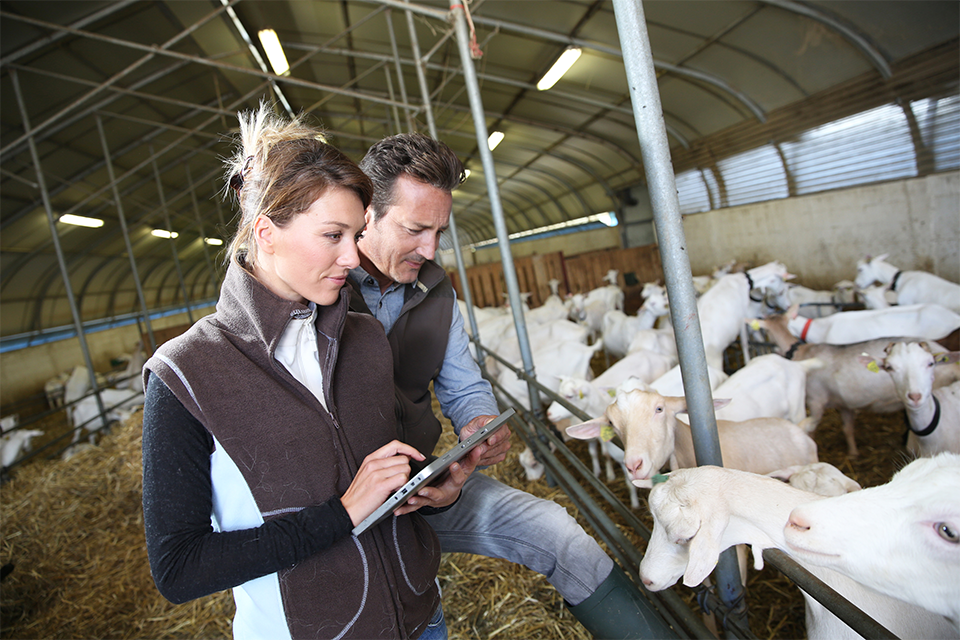
11.3 How we are governed
We are governed by BDUK’s Board, which operates under the provisions of a Framework Agreement[footnote 26] approved by the DCMS Permanent Secretary while this was BDUK’s sponsor department. We moved to a new sponsor department in February 2023, we are working with DSIT to update the agreement. Accountability for BDUK activities and decision-making rests with Paul Norris, our Chief Executive Officer and Senior Responsible Owner.
The Framework Agreement
The Framework Agreement sets out the Secretary of State’s requirements from BDUK and its Board. It provides us with authority to pursue our strategy as articulated in this Corporate Plan and the freedoms to execute our business effectively. It also specifies the governance arrangements for BDUK.
BDUK’s Board
BDUK’s Board is shown below:
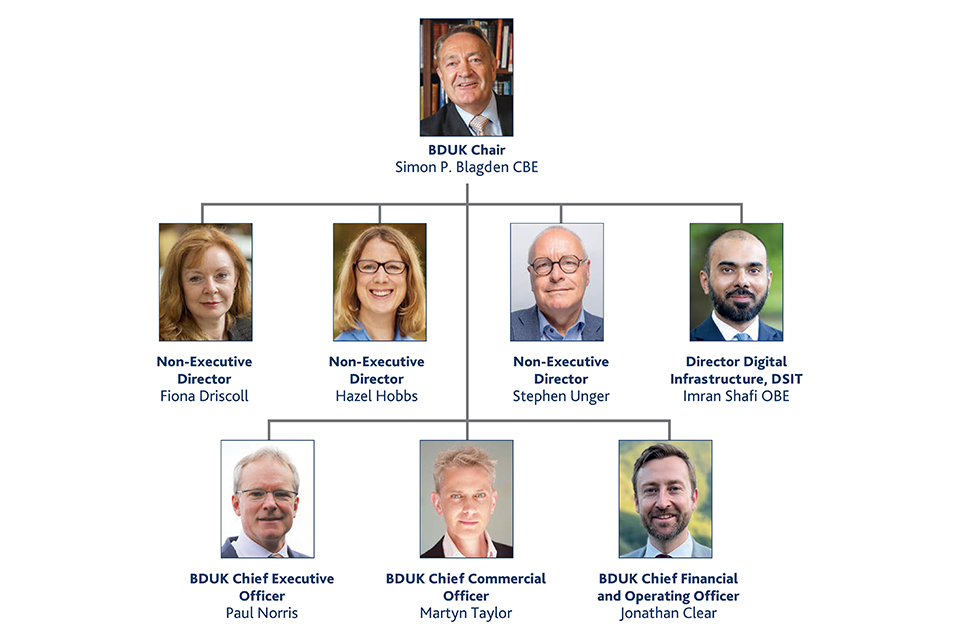
Under the provisions of the Framework Agreement, the Board has the following membership:
-
a Non-Executive Chair, who is responsible for leading the Board and ensuring it effectively discharges its role
-
at least three Non-Executive Directors (NEDs)
-
three BDUK Executives - the Chief Executive Officer, Chief Commercial Officer, and Chief Financial and Operating Officer
-
at least one DSIT Representative to provide a link between BDUK and the department
The principal roles of the Board are to:
-
endorse BDUK’s strategy and ensure that strategy is reflected in BDUK’s Corporate Plan
-
monitor and assess BDUK’s performance against Key Performance Indicators as agreed with the departmental sponsor
-
provide advice, challenge and support to BDUK’s Chief Executive and senior executive team, and hold them to account for delivery of BDUK’s strategy and objectives
-
oversee the financial and operating controls in place, ensuring they are in compliance with the authority given to BDUK and its Chief Executive
Support for BDUK’s Board
BDUK’s Board is supported by three committees:
-
the Audit and Risk Assurance Committee
-
the Finance and Commercial Committee
-
the People and Development Committee
The combination of these committees will deliver robust oversight and additional assurance, including on financial, commercial and workforce decisions.
Sitting below the Board are three supporting executive boards:
Project Gigabit Programme Board
Chaired by the Chief Executive Officer, this board provides oversight of work and makes decisions relating to the Project Gigabit programme.
Shared Rural Network Programme Board
Chaired by the Chief Executive Officer, this board provides oversight of work and makes decisions relating to the SRN programme.
Change and Operations Board
Chaired by a member of the executive team, this board provides oversight and decision making around BDUK operations and corporate services, including prioritisation of resources and organisation changes.
BDUK’s governance structure diagram
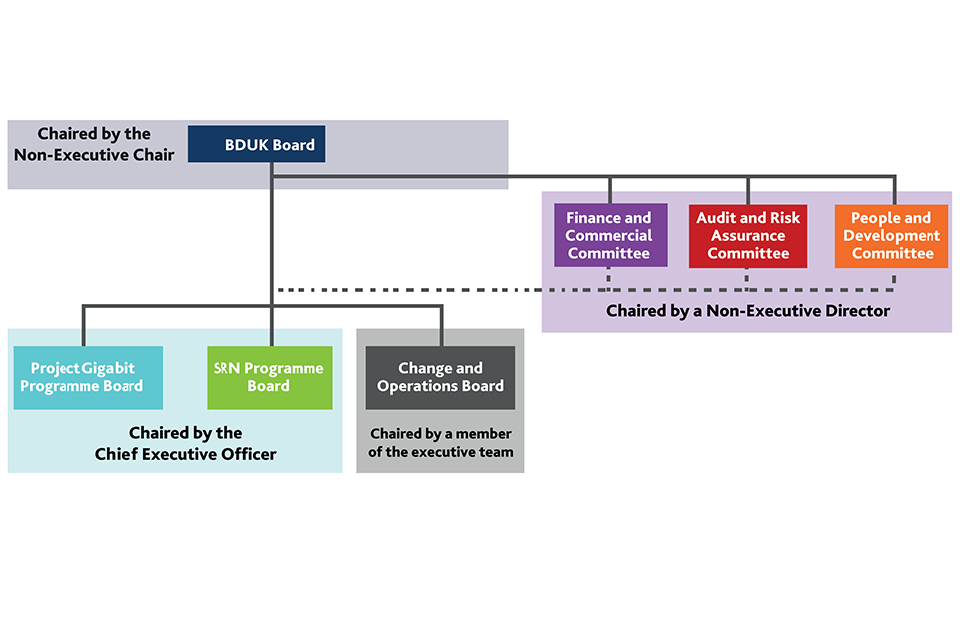
Governance in detail: The Senior Leadership Team
BDUK is led by Paul Norris. As its Chief Executive Officer and Senior Responsible Owner, Paul is supported by a Chief Commercial Officer and a Chief Financial and Operating Officer, collectively forming the BDUK Executive.
The Executive is supported by the wider Senior Leadership Team, including:
-
the Project Gigabit Programme Director, responsible for the delivery of Project Gigabit
-
the Director for Analysis, Evaluation and Strategy, responsible for BDUK’s strategy and analytics
-
the Director for Finance and Human Resources, responsible for BDUK’s Human Resources and Finance functions
-
the Director for Commercial, responsible for BDUK’s commercial activities, such as Gigabit contracts
-
the Director for Digital, Data and Technology, responsible for designing and implementing BDUK’s technical solutions
-
the Director for Transformation, Change and SRN, responsible for transforming BDUK into a highly efficient specialist delivery organisation and responsible for the delivery of the SRN programme
-
the Director for Risk, Compliance and Governance, responsible for designing and implementing BDUK’s governance, risk and assurance frameworks
-
the Director for Engagement and Public Information, responsible for BDUK’s wider communications with stakeholders, Parliament and the public
Departmental Sponsor
DSIT is our sponsor department. We also continue to build strong working relationships with other government departments.
The primary contact with DSIT is through the DSIT Sponsor Team. The responsible Senior Civil Servant for this relationship is the Director General for Digital, Technology, and Telecoms. DSIT is also represented on the BDUK Board by the Director for Digital Infrastructure, and on the Project Gigabit and SRN Programme Boards by relevant officials. The Sponsor Team forms the main source of advice to the Responsible Minister and Principal Accounting Officer in their responsibilities overseeing BDUK’s overall governance.
-
95% of the UK geography will have coverage from at least one mobile network operator. ↩
-
‘Levelling Up the United Kingdom’, UK Government, published 2 February 2022. ↩
-
Digital Mobile Spectrum Limited (DMSL), a joint venture of all four mobile operators, manages and runs the SRN programme and provides reporting and tracking information for the four MNOs, DSIT and Ofcom. ↩
-
BDUK’s Gigabit Voucher scheme interacts directly with citizens through the website https://gigabitvoucher.culture.gov.uk/. ↩
-
Internet speeds of 1 gigabit (or 1,000 megabits) per second. ↩
-
1.56 million is taken from 5% of the Ofcom premises base as at April 2021, when Project Gigabit launched. The premises being delivered by BDUK are based on our own premises base, which includes addressable premises (such as apartments in Houses of Multiple Occupancy) not listed on Ofcom’s premises base. ↩
-
‘Project Gigabit progress update, June 2023’, published 30 June 2023. ↩
-
‘Project Gigabit progress update, June 2023’, published 30 June 2023. ↩
-
Extended Area Service (EAS) is part of the Home Office’s Emergency Service Network (ESN) and will ensure coverage in the most rural and remote parts of the United Kingdom. The EAS masts built for ESN will be made available for other mobile operators to offer commercial mobile coverage under the SRN programme. ↩
-
ThinkBroadband, June 2023. ↩
-
DSIT estimate from supplier reports, June 2023. Figures are based on total connections, not adjusted for unique connections. ↩
-
DSIT estimate, May 2023 ↩
-
BDUK estimate, June 2023 ↩
-
See Project Gigabit Intervention Areas map for progress. ↩
-
Based on the current procurement pipeline, there may be further areas in which procurements have not been currently identified as the most appropriate approach. ↩
-
Extended Area Service (EAS) is part of the Home Office’s Emergency Service Network (ESN) and will ensure coverage in the most rural and remote parts of the United Kingdom. The EAS masts built for ESN will be made available for other mobile operators to offer commercial mobile coverage under the SRN programme. ↩
-
Digital Mobile Spectrum Limited (DMSL), a joint venture of all four mobile operators, manages and runs the SRN programme and provides reporting and tracking information for the four MNOs, DSIT and Ofcom. ↩
-
Total Not Spots are areas where there is currently no coverage from any mobile operator. ↩
-
See maps showing projected coverage by the end of the SRN programme. ↩
-
An Intervention Area is the geographical area that we have assessed as eligible for support from our interventions. ↩
-
Contracts with a net annual value of £5 million or more. ↩
-
‘Procurement Policy Note 06/21: Taking account of Carbon Reduction Plans in the procurement of major government contracts’, updated 9 January 2023. ↩
-
‘Greening Government Commitments 2021 to 2025’, updated 15 December 2022. ↩
-
‘Procurement Policy Note 06/20 – taking account of social value in the award of central government contracts’, published 24 September 2020. ↩
